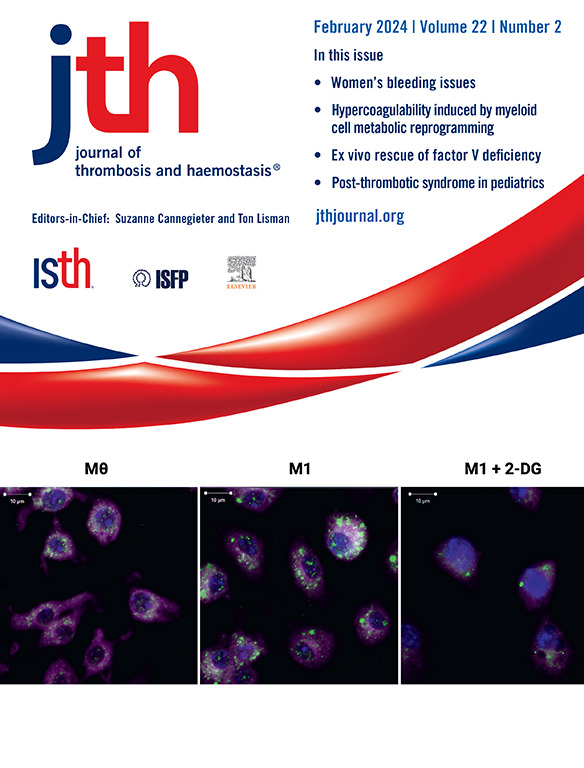癌症患者的静脉血栓栓塞和因子XI缺乏。
IF 5
2区 医学
Q1 HEMATOLOGY
引用次数: 0
摘要
背景:在普通人群中,因子XI (FXI)缺乏与静脉血栓栓塞(VTE)风险降低有关,而不会增加自发性出血。FXI抑制剂在骨科手术中显示出预防静脉血栓栓塞的希望,目前正在研究癌症相关静脉血栓栓塞。然而,目前还没有关于FXI抑制癌症患者高凝性的潜在疗效的数据。目的:与匹配的对照人群相比,评估癌症和FXI缺乏患者的静脉血栓栓塞发生率。患者/方法:这是一项在纪念斯隆-凯特琳癌症中心(MSKCC)进行的回顾性研究,评估癌症和FXI缺乏症患者(n=73)的静脉血栓栓塞发生率,以及与癌症和正常部分凝血活素时间(n=185)相匹配的对照组。索引日期为首次到MSKCC进行癌症评估的日期。跟踪记录直至静脉血栓栓塞、死亡或最后一次随访,以先发生者为准。来自两个队列的患者在年龄、性别、自索引日期起30天内的手术、原发癌症部位和分期、索引时的血小板和血红蛋白水平等方面进行匹配。结果:12个月时,FXI缺乏症患者的静脉血栓栓塞累积发生率为4.1%(95%可信区间[CI]: 1.1-11%),而匹配对照组的静脉血栓栓塞累积发生率为10.6% (95% CI: 6.6-16%, Gray检验p=0.052)。从指标日期到随访结束,12.9%的FXI缺乏症患者接受手术,而对照组为2.1%。结论:FXI缺乏似乎与癌症患者静脉血栓栓塞风险降低有关。本文章由计算机程序翻译,如有差异,请以英文原文为准。
Venous thromboembolism in patients with cancer and factor XI deficiency
Background
Factor (F)XI deficiency is associated with reduced venous thromboembolism (VTE) risk without increased spontaneous bleeding in the general population. Factor XI inhibitors show promise in preventing VTE in orthopedic surgery and are currently being investigated in cancer-associated VTE. However, there currently are no data regarding the potential efficacy of FXI inhibition for the management of hypercoagulability in cancer.
Objectives
This study aimed to evaluate the incidence of VTE among patients with cancer and FXI deficiency compared with that of a matched control population.
Methods
This is a retrospective study performed at Memorial Sloan Kettering Cancer Center evaluating VTE incidence in patients with cancer and FXI deficiency (n = 73) and matched controls with cancer and normal partial thromboplastin time (n = 185). Index date was the date of first visit at Memorial Sloan Kettering Cancer Center for cancer evaluation. Patients were followed up until VTE, death or last follow-up, whichever occurred first. Patients from the 2 cohorts were matched for age, sex, surgery within 30 days from index date, primary cancer site and stage, and platelet and hemoglobin levels at index.
Results
At 12 months, the cumulative incidence of VTE in the cohort with FXI deficiency was 4.1% (95% CI, 1.1%-11%) compared with 10.6% (95% CI: 6.6%-16%; Gray test, P = .052) in the matched controls. Major surgery-related bleeding occurred in 12.9% of patients with FXI deficiency undergoing surgery from the index date through the end of follow-up, compared with 2.1% in the control cohort.
Conclusion
Factor XI deficiency appears to be associated with reduced VTE risk in individuals with cancer.
求助全文
通过发布文献求助,成功后即可免费获取论文全文。
去求助
来源期刊
CiteScore
24.30
自引率
3.80%
发文量
321
审稿时长
1 months
期刊介绍:
The Journal of Thrombosis and Haemostasis (JTH) serves as the official journal of the International Society on Thrombosis and Haemostasis. It is dedicated to advancing science related to thrombosis, bleeding disorders, and vascular biology through the dissemination and exchange of information and ideas within the global research community.
Types of Publications:
The journal publishes a variety of content, including:
Original research reports
State-of-the-art reviews
Brief reports
Case reports
Invited commentaries on publications in the Journal
Forum articles
Correspondence
Announcements
Scope of Contributions:
Editors invite contributions from both fundamental and clinical domains. These include:
Basic manuscripts on blood coagulation and fibrinolysis
Studies on proteins and reactions related to thrombosis and haemostasis
Research on blood platelets and their interactions with other biological systems, such as the vessel wall, blood cells, and invading organisms
Clinical manuscripts covering various topics including venous thrombosis, arterial disease, hemophilia, bleeding disorders, and platelet diseases
Clinical manuscripts may encompass etiology, diagnostics, prognosis, prevention, and treatment strategies.

 求助内容:
求助内容: 应助结果提醒方式:
应助结果提醒方式:


